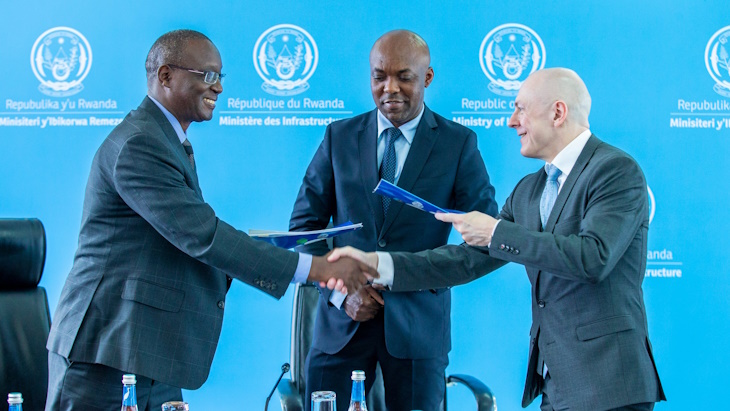The Rwanda Atomic Energy Board (RAEB) has signed an agreement with Dual Fluid to collaborate on the development of a demonstration Dual Fluid nuclear reactor in Rwanda. The demonstration reactor is expected to be operational by 2026.

The signing ceremony was witnessed by Minister of Infrastructure Ernest Nsabimana (Image: Ministry of Infrastructure)
The Government of Rwanda has agreed to provide the site and infrastructure for the project, while Dual Fluid is responsible for the technical implementation of the partnership. Rwandan scientists will also receive practical training in nuclear technology.
Dual Fluid, a Canadian-German nuclear company founded in 2021, says it is creating an "entirely new type of nuclear reactor" using two circulating fluids, one of liquid fuel and the other a lead coolant. The company says the high efficiency offered by the concept, which it describes as a "Generation V" reactor, could "exponentially" increase reactor performance. The company has described its concept in more depth in a whitepaper.
"The government of Rwanda has committed to provide the site and Infrastructure for the project while Dual Fluid is responsible for the technical implementation of the partnership," Rwanda's Ministry of Infrastructure said on X (formerly Twitter). "The nuclear reactor technology will be added to the existing energy generation mix to accelerate growing energy demand, boost the industrial development and build an economy that is resilient to climate change and reduce the cost of fossil fuels."
"In order to meet the growing energy demand of its population, to boost the development of its industrial sector, and to build an economy that is resilient to climate change, Rwanda is looking at nuclear energy to add to its energy generation mix," RAEB CEO Fidel Ndahayo said. "In the spirit of remaining a 'proof-of-concept' destination as a strategy to accelerate the integration of innovative technologies, Rwanda is establishing strategic partnerships with start-up companies involved in the design and development of small modular nuclear reactor technologies."
Dual Fluid CEO Götz Ruprecht said time was a critical factor for the company. "After years of detailed preparation and concept improvement, we are now convinced that we have found an ideal partner for the first realisation of our groundbreaking technology," he said. "The reason why Dual Fluid chose to invest in Rwanda is its highly favourable governance and business environment that has already attracted major international players. Our demonstration reactor will show that a better, far more efficient way of generating nuclear energy is possible and within reach in the near future."
Rwanda has been looking towards nuclear energy for some time, signing an intergovernmental agreement with Russia on the use of nuclear energy in 2018, followed by two memorandums of cooperation on education and personnel training and on developing public acceptance of nuclear energy. The RAEB, which is intended to coordinate research and development of nuclear energy activities in the country, was established by the Rwandan government in 2020.
Earlier this year, RAEB Chairman Lassina Zerbo spoke to World Nuclear News about his vision of Rwanda as a "pilot country" in Africa, with ambitions for a ministerial round table discussion "to bring those in Africa who are interested in this field to talk, to work together to combine efforts in order to go as quickly and as best as possible to achieve the peaceful use of nuclear energy in the continent."
Researched and written by World Nuclear News